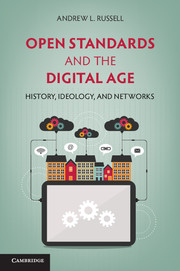
Hoy he leído acerca de la publicación de un libro titulado Open Standards and the Digital Age: History, Ideology, and Networks (Cambridge University Press, 2014), escrito por Andrew L. Russell (página web), profesor del Stevens Institute of Technology en New Jersey (Estados Unidos).
La pregunta con la que se inicia la recensión del libro ha capturado mi atención, ya que constituye uno de los temas sobre los que he estado leyendo reflexionando más a lo largo del último mes:
How did openness become a foundational value for the networks of the twenty-first century?
La pregunta debería ir precedida por otra, ¿qué entendemos por Openness? Es más ¿qué significa Openness en cada contexto? Sin duda hay mucha confusión al respecto, probablemente porque el principio en sí se ha convertido en una especie de icono del siglo XXI. Desde el punto de vista de los estudios de Digital Scholarship, la característica open aparece asociada a lo digital de forma natural (por ejemplo, tal y como lo plantea Weller en 2011 en su libro The Open Scholar); sin embargo, los digital no necesariamente va asociado a lo abierto (o libre; no entre aquí en las diferencias), como bien señalan los defensores del software libre, en una batalla más ética que tecnológica. Así se habla también del Open Digital Scholarship o del Public Scholarship, cuando hacemos referencia a un compromiso público.
Sin lugar a dudas este libro puede ayudar a responder algunas de estas preguntas. Al menos eso espero poder contar una vez lo haya leído. Dejo aquí el resto de la recensión.
Open Standards and the Digital Age answers this question through an interdisciplinary history of information networks that pays close attention to the politics of standardization. For much of the twentieth century, information networks such as the monopoly Bell System and the American military’s Arpanet were closed systems subject to centralized control. In the 1970s and 1980s, however, engineers in the United States and Europe experimented with design strategies to create new digital networks. In the process, they embraced discourses of “openness” to describe their ideological commitments to entrepreneurship, technological innovation, and participatory democracy.
The rhetoric of openness has flourished – for example, in movements for open government, open source software, and open access publishing – but such rhetoric also obscures the ways the Internet and other “open” systems still depend heavily on hierarchical forms of control.
Contents:
1. Introduction
2. Ideological origins of open standards I: telegraph and engineering standards, 1860s–1900s
3. Ideological origins of open standards II: American standards, 1910s–1930s
4. Standardization and the monopoly Bell System, 1880s–1930s
5. Critiques of centralized control, 1930s–1970s
6. International standards for the convergence of computers and communications, 1960s–1970s
7. Open systems and the limits of democratic design, 1970s–1980s
8. The Internet and the advantages of autocratic design, 1970s–1990s
9. Conclusions: open standards and an open world.

